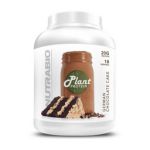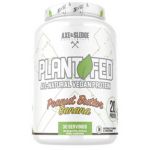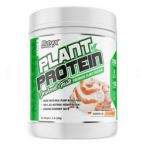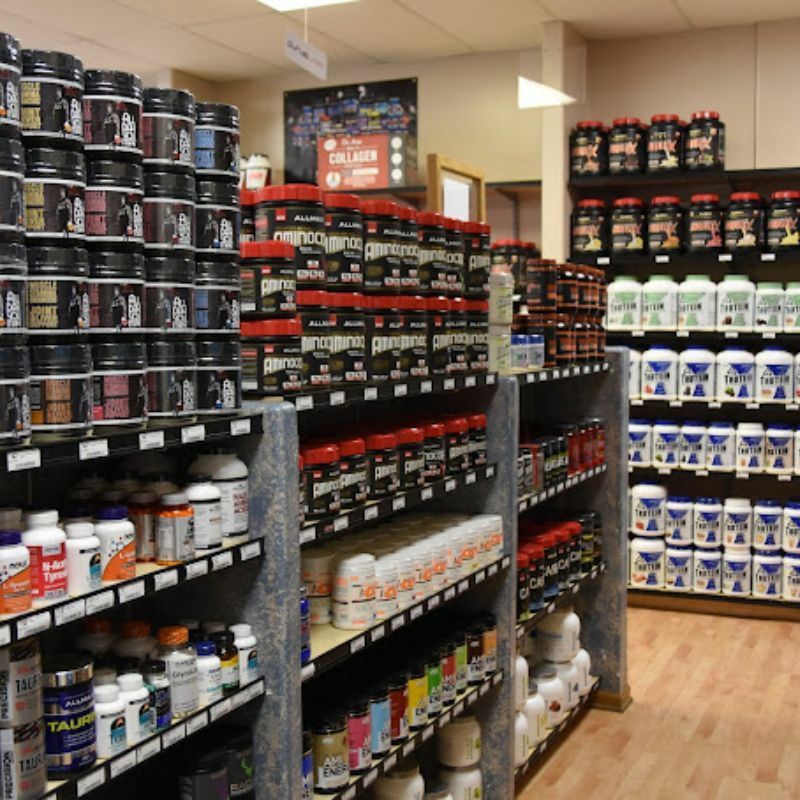Choosing The Best Plant Based Protein Powder
Over the years Vegan and Vegetarian Diets have grown in popularity and with that so has the interest in Plant Based Protein Powders, with many non-vegans and non-vegetarians choosing Plant Based Protein Powders over their whey and/or animal based counterparts. Plant Based Protein Powders are also becoming very popular among those who struggle to digest dairy.
If you're new to Plant Based Protein Powders, as you might imagine, they're derived from plant sources such as peas, hemp, soy, and brown rice among other sources and offer a great way to meet your daily protein requirements without relying on animal sources.
With increasing awareness about the benefits of plant based nutrition, including lower cholesterol levels, improved digestion and a reduced carbon footprint, more customers are turning to plant based protein powders as a key part of their fitness and wellness routines. It also helps tremendously that the taste and texture of plant based protein powders has improved dramatically over the years.
But what is a plant based protein powder exactly? Simply put, it's a concentrated protein source extracted from plants. Unlike traditional protein powders made from whey, casein, egg or meats, plant based options are dairy free and often hypoallergenic. They come in a variety of forms and flavors allowing customers to meet their preferred flavor profile, and while they used to be chalky and gross, the taste and texture has improved dramatically over the years with some even giving whey proteins a run for their money on that front.
In this post we'll be discussing plant based protein powders, what they are, the benefits, how they compare to traditional whey proteins and how to choose a good plant based protein powder based on your needs.
Why Choose A Plant Based Protein Powder?
While whey protein has long been the go to choice for weightlifters, bodybuilders and fitness enthusiasts, many are opting for plant based protein powders instead and plant based protein powders offer a variety of unique benefits making them an increasing popular alternative.
Why choose a plant based protein powder you may ask? Plant based protein powders are naturally free from common allergens like dairy which make it a great option for those who struggle to digest dairy or those who are lactose intolerant.
Plant based protein powders also are great for vegans and vegetarians who are looking for a protein powder that aligns with their dietary and ethical values and they generally have a lower environmental footprint compared to whey protein which is derived from dairy.
In terms of benefits plant based protein powders are rich in fiber and nutrients, have been shown to reduce inflammation, are versatile for various diets including vegan, paleo and gluten free, and are gentler on the digestive system compared to whey and help to improve gut health.
Whey Protein Vs Plant Based Proteins
While plant based protein powders offer many benefits, they are in some ways inferior to whey or animal based protein powders for several reasons. First, many lack a complete amino acid profile. Whey Protein is known for its complete amino acid profile meaning it contains all nine essential amino acids in optimal proportions which is important for muscle growth and recovery. While some plant based proteins like soy and hemp are complete proteins, many others such as rice and pea proteins may lack certain amino acids or have them in lower quantities meaning some plant based proteins won't be as effective in supporting muscle protein synthesis unless they are blended to create a more balanced amino profile.
Plant Based Protein Powders also sometimes lack the bioavailability of their whey counterparts. Bioavailability refers to how easily the body can digest and utilize the protein. Whey protein generally has a higher bioavailability compared to plant based proteins meaning your body can absorb and use whey more efficiently.
Beyond that plant based proteins typically have a lower protein content per serving than they proteins which means you need to consume more of it and in regards to cost, whey protein is oftentimes more cost effective than plant based proteins.
None of this means you shouldn't use plant based proteins, they're great options for vegans and vegetarians. They're easier to digest for many people, and others use them to help lower their carbon footprint
Are Plant Based Proteins Good For Building Muscle?
When it comes to building muscle many people automatically think of whey protein due to its high bioavailability and rich amino acid profile, however plant based proteins powders can also be effective for muscle growth providing you choose the right products and use them strategically.
BCAAs, particularly leucine are essential for muscle protein synthesis, the process that leads to muscle growth. Some plant based protein powders may be lacking certain amino acids or have a low leucine content making them loss potent in promoting muscle building on their own. That said many protein powders have been formulated to address this shortcoming. Pea Protein for instance is fairly high in BCAAs and when combined with other plant proteins like rice or hemp you can achieve a more balanced amino acid profile that supports muscle growth.
A number of recent studies also have shown that plant based protein powders can be just as effective as whey protein for muscle gain. One particular study found that individuals who consumed plant based proteins such as pea or soy can experience similar increases in muscle mass and strength as those who consume whey, especially when these protein powders are consumed as part of a well rounded diet.
One of the keys to maximizing the muscle building potential of plant based protein powders is to combine different protein sources to create a complete amino acid profile, an example of this is combining pea proteins which is low in methionine with brown rice protein which is low in lysine but high in methionine. When choosing a protein powder look for a blend which will offer a convenient way to ensure you're getting a well rounded amino acid profile that supports muscle building.
What To Look For In A Plant Based Protein Powder?
Choosing a plant based protein powder can be confusing, there's many options available, some single source plant based proteins, others blends, plus you want one with a good taste and texture. In this section our aim is to help you in regards to what you should be looking for when choosing a plant based protein powder.
Complete Vs. Incomplete Proteins
When choosing a plant based protein powder its important to understand the difference between complete and incomplete proteins. Complete proteins contain all nine essential amino acids, those which the body can't produce on its own. While whey is a complete protein, many plant based proteins like rice or pea protein are incomplete. You can however find protein blends which contain different sources of protein ie pea and rice to create a complete amino profile ensuring your body gets the nutrition it needs for muscle growth and repair.
Grams Of Protein Per Serving
Meeting your daily protein needs is important, especially if you're active, an athlete or someone looking to build muscle. The recommended protein intake varies based on factors like age, activity level and fitness goals but a general rule of thumb is 0.8 grams of protein per kilogram of body weight or 0.36 grams per pound for those of us who don't care for the metric system. While plant based protein powders typically contain less protein than their whey counterparts, you should aim for a protein powder that provides 15-25 grams of protein per serving. Most plant based proteins tend to contain around 20 grams of protein
Avoid Artificial Flavors & Sweeteners
Many if not most supplements contain artificial flavors, sweeteners and preservatives, though it is hopeful to see more and more companies trying to be more natural using naturals flavors, natural colors and natural sweeteners. Plant Based Protein Powders seem to cater to more of a natural audience so you'll likely see more options that don't contain these things. Instead of artificial sweeteners try to seek out protein powders that use natural alternatives like stevia, monk fruit, or coconut sugar. These sweeteners provide a pleasant taste without the potential negative health effects.
Taste, Texture & Versatility
Whey protein is known for its smooth texture and neutral taste which makes it easy to incorporate into shakes and recipes. Plant based prtoeins can have a grittier texture and stronger flavors but this has improved significantly in recent years. Before purchasing a plant based protein powder be sure to read reviews paying special attention to comments about taste and texture, we'll also have some recommendations from personal experience to share with you at the end of this article.
Our Favorite Plant Based Proteins
When it comes to plant based protein powders there's plant based protein powders that contain only a single protein source and those which contain blends providing a full amino acid profile. There's great tasting protein powders with great textures, and then there's those that taste like you're drinking water with sawdust in it. In this section we wanted to provide you some recommendations on our favorite plant based protein powders.

NutraBio is a fantastic company who puts out incredibly "clean" products, even going as far as to list the exact amounts of "Other Ingredients", for example they'll list something like 220mg xanthan gum where as most companies won't do that. NutraBio Plant Protein also contains 25.6 grams of plant protein, sourced from both whole yellow pea protein and brown rice protein. Not only is this much higher in protein content than most plant based proteins but it contains a full amino acid profile. In regards to taste and texture, while you can tell it's a plant protein it does have a smoother texture than most and a very solid taste with all three flavors tasting good.

Axe & Sledge Plant Fed Vegan Protein
Right off the bat one thing we really like is that Plant Fed contains 30 servings per tub, while it is a bit pricier than some other options we love seeing a full month supply as opposed to the 18 or 20 servings most plant based protein powders give you. Plant Fed contains 20 grams of protein sourced from both pea and rice protein giving you a full amino acid profile, and it's sweetened with Stevia and Monk Fruit

Nutrex Research Plant Protein has been out for a while and was one of the first decent tasting plant based proteins with a good texture. It features 20 grams of protein per serving with a very full amino profile as the protein comes from a blend of Yellow Pea Protein, Brown Rice Silk Protein, Pumpkin Seed Protein, and Sunflower Seed Protein, one of the most diverse protein sources we've seen. It's also naturally flavored, sweetened with natural sweeteners like Agave and Monk Fruit and comes in a variety of tasty flavors including German Chocolate Cake, Vanilla Caramel, Cinnamon Cookies and Strawberries and Cream.
†The content of this blog post is intended solely for reference and entertainment purposes. We do not offer medical advice or specific guidance regarding the products discussed. Our insights are based on a combination of anecdotal experiences, online studies/reviews, manufacturer details, and customer feedback. While we strive to present accurate and current information, we cannot assure its completeness or its alignment with the most recent product formulations or data. For any concerns or up-to-date information, we recommend visiting the manufacturer's website directly. The opinions and information provided here do not necessarily reflect the views of Best Price Nutrition; they represent the perspectives and information from the manufacturers and users. Furthermore, these statements have not been evaluated by the Food and Drug Administration. The products mentioned are not intended to diagnose, treat, cure, or prevent any disease or illness.
Recent Posts
-
Collagen & Elastin Supplements: A Comprehensive Guide
Collagen and elastin are vital proteins in our body and are best known for helping to maintain healt
-
Does The Honey & Salt Preworkout Work?
The Honey & Salt Preworkout TrendThe health and fitness space is full of trends whether its the
-
Everything You Need to Know About Rybelatrim for Weight Loss
Introduction: What is Rybelatrim?Rybelatrim is quickly gaining attention as one of the newest weight










